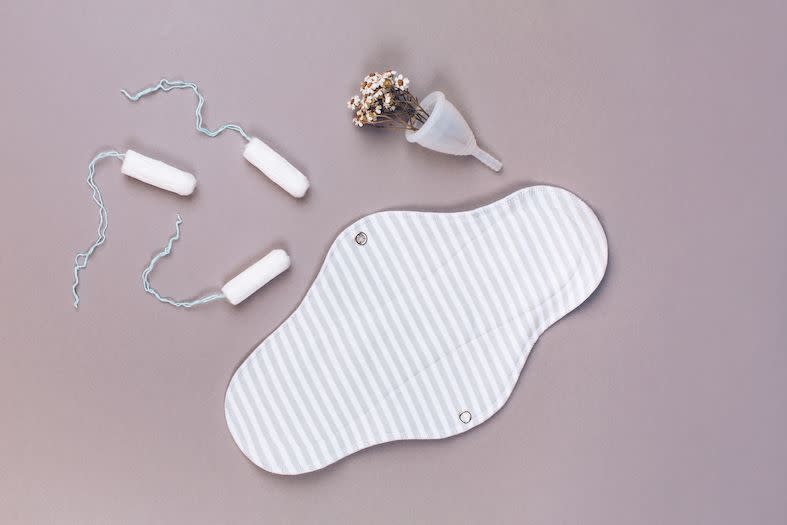Do CBD tampons actually help with period pain? We put them to the test...

The buzz around CBD and it's supposed many benefits (there's mounting evidence to show that it can help with everything from sleep problems to some types of chronic pain) has been on the up over the past few years – and now, talk has even turned to CBD tampons.
But, do CBD tampons actually work when it comes to helping with savage cramps? And how do you know if they're safe to use?
We investigated, by putting female health brand Daye's CBD-infused tampons on trial, and digging into the science behind them.
What is CBD?
Okay, first up: CBD is not the same as weed (or at least not in the way you probably think about cannabis e.g. being smoked in order to get high). But the confusion is understandable, as CBD is a non-psychoactive compound that's also derived from cannabis plants.
Libby Clarke, Managing Consultant, Toxicology, at specialist cannabinoid scientific company Broughton, explains, "CBD is a cannabinoid that occurs naturally in cannabis plants, it is not psychoactive which means it won’t make you feel 'high'.
"The high associated with cannabis use comes from THC, which is a different cannabinoid."
So, now we've clear that CBD is non-psychoactive, what does it do? Well, CBD is increasingly being used for pain relief, says Dr Nazreen Morley (MbChB, MRCGP), a GP and the medical director of Dr Naz aesthetics clinics.
There's "some research that suggests this can be effective", when it comes to pain relief, but "research is very much emerging in this space," the expert notes.
Are CBD tampons safe to use?
Currently, the evidence on CBD and its safety and effectiveness is limited by way of long term studies – and one problem that some people face is that different products are regulated differently.
Clarke explains, "CBD is regulated in different ways depending on the product type, for example, oils and gummies are regulated by the Food Standards Agency, and there are specific regulations for cosmetics and intimate care products."
So it's vital that you do your due diligence when purchasing anything that claims it contains CBD. However, Daye make it very clear that they've gone to great lengths to ensure their CBD tampons are safe.
Sharing general advice Dr Morley says: "Tampons, in the UK at least, are regulated by the General Product Safety Regulations 2005. So you can generally trust that tampons sold in the UK are safe to use."
"When you buy any product with CBD, particularly if you’re buying online, buy from a reputable retailer in the UK," the pro adds. "CBD regulations are different in different countries and so too are product safety regulations, cosmetic product regulations and food and drink regulations."
If you're considering buying a CBD product, there are also plenty of considerations you should keep in mind. Broughton's Clarke recommends looking out for:
Clear CBD labelling – the amount of CBD in milligrams (mg) gives you a better idea of the strength of the product compared to CBD %
Information on lab testing – or a website link shows the certificate of analysis
The soil association “organic standard” badge – cannabis plants may accumulate pesticides, which aren’t used if plants are grown organically
"Broad spectrum" – these products contain other cannabinoids in addition to CBD, and may be more effective than pure CBD "isolate" products.

Remember, this advice applies to anytime you're shopping for CBD products, not just tampons, especially as CBD is increasingly being incorporated into women's healthcare and wellness items.
Cosmetic doctor and intimate health specialist Dr Shirin Lakhani, explains, "While research is still ongoing, there is some evidence that suggests CBD might be beneficial for women’s health. Research suggests that CBD could potentially reduce hot flashes and night sweats associated with menopause. It could also help with mood swings, irritability, and fatigue."
“It may help with symptoms related to the menopause, such as stiffness of joints, migraines, anxiety and mood as well as appetite and it may also improve your sex life once you start to feel better," the pro adds.
How does CBD help to stop period pain?
So how exactly might CBD help with cramps? "CBD’s anti-inflammatory and analgesic properties may help alleviate menstrual pain and reduce the severity of cramps when applied topically or ingested. It may also be beneficial in reducing the pain of endometriosis," explains Dr Lakhani.
But please remember to follow instructions carefully when using topical balms or patches to soothe aches and pains, and avoid intimate areas unless it is specifically stated the product is safe to use in such a way. "CBD oils are intended, generally, to be absorbed on the tongue or swallowed. No product, unless specifically designed for use internally in intimate areas, should be used as such. Always follow the instructions on any cosmetic or supplement product you buy," advises Dr Morley.
Can you put CBD oil on a tampon?
If you're wondering whether you can add CBD oil to tampons you've already purchased, the answer is a firm: no.
"Please do not add your own CBD oil to tampons," says Dr Lakhani. "This could upset the balance of bacteria and acids in the vagina and lead to irritation and infection."
Clarke adds: "It wouldn’t be recommended to add CBD oil to a tampon, it’s unlikely that much of the dose would be absorbed, and CBD oils for oral use haven’t been tested on intimate areas."
Our honest reviews of CBD tampons by Daye:
"After months of googling ‘bad period pain remedies,’ I came across Daye to help ease my dreaded PMS symptoms – which range from abdominal cramps, backaches, and sore legs. The CBD-infused tampons almost instantly helped with my usual discomfort, helping me say goodbye to the little person who usually stabs from the inside.
I found myself relaxing and un-tensing my entire body, knowing something was helping the pain. It felt as though I was dealing with significantly less pelvic pressure and that transformed my period, making it ten times more manageable.
With the brand being 0% plastic as the tampons come in dissolvable wrappers with sugarcane applicators, it was a nice change knowing the planet loves them, too.
Comfortable, super absorbent, and organic I found them hard to fault." – Thérèse, Fashion Assistant
"While I’m not a chronic period pain sufferer, I do find that the day before and/or on the day that Mother Nature arrives, uncomfortable cramps certainly creep in, as well as the odd back ache. Oh, and not to mention a major case of PMS (if you’re here, I’m sure you know the feeling). So, when I caught wind of Daye’s CBD tampons, I was all for putting them to the ultimate menstrual test.
After creating my customer order on the Daye website (you can choose between a mix of CBD-infused and normal tampons), initially, I was skeptical; Will they feel different?; Will they be uncomfortable?; Will they be scented? And to all of the former, the answer is no. The super and regular sizes were as expected (I normally use Tampax Compak Pearl and they were incomparable) and the applicator was a dream to use.
I tried out Daye’s Nude (orignal/normal tampons) as well as their CBD-coated option and to say I’m now a fan of both would be an understatement. I didn’t experience a twinge of pain (which could, in fact, be a placebo? But we move), nor did I encounter any leaking – which, sometimes can happen… TMI? I think not.
Admittedly, they do sit at the pricier end of menstrual products, meaning I would be inclined to recommend these for those who suffer from regular and chronic pain, whether that be cramps, backache or PMS. But regardless, let’s just say I had a bloody good period. Soz. P.S. The tin tampon case is *so* cute. So much so that it’s now a handbag staple of mine. Winning." – Lia, Beauty Assistant
This article is not intended to be a substitute for professional medical advice or diagnosis. Always seek the advice of your physician or other qualified health provider with any questions you may have regarding a medical condition.
You Might Also Like

 Yahoo Sports
Yahoo Sports 